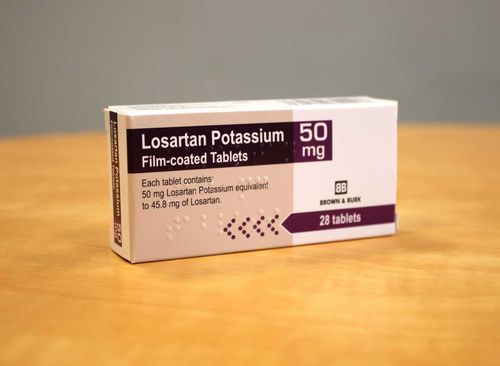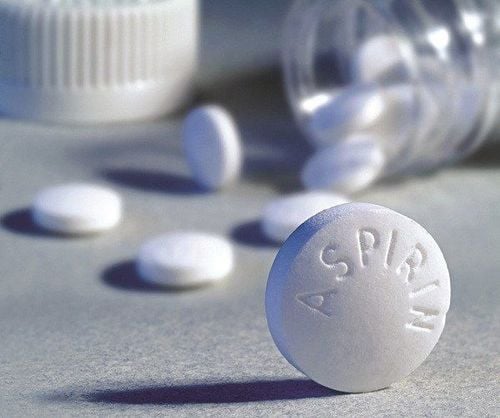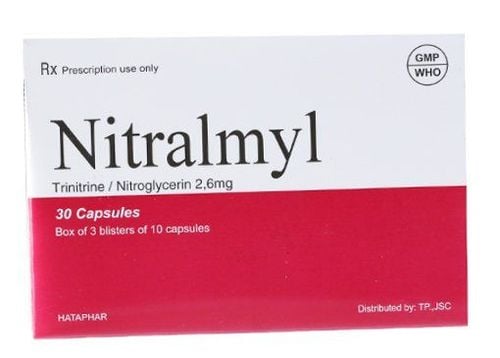This is an automatically translated article.
The article is professionally consulted by Master, Doctor Hoang Thi Hoa - Cardiologist - Department of Medical Examination and Internal Medicine - Vinmec Ha Long International General Hospital.Mitral valve prolapse, although not directly life-threatening, can cause discomfort and directly affect the patient's life. Therefore, early diagnosis and prompt treatment are required.
1. What is mitral valve prolapse?
Mitral valve prolapse is a condition in which one or both leaflets are damaged and inflated, protruding into the left atrium when the left ventricle contracts. Thus, when the heart contracts to expel blood, a small amount of blood leaks back into the left atrium, leading to mitral regurgitation. In most cases, mitral valve prolapse is not life-threatening and does not require treatment. However, mitral valve prolapse causes anemia to other organs which can lead to shortness of breath, chest pain, fatigue,...Mitral valve prolapse is also known by other names such as:
Floppy valve syndrome Mitral valve aneurysm Barlow's syndrome
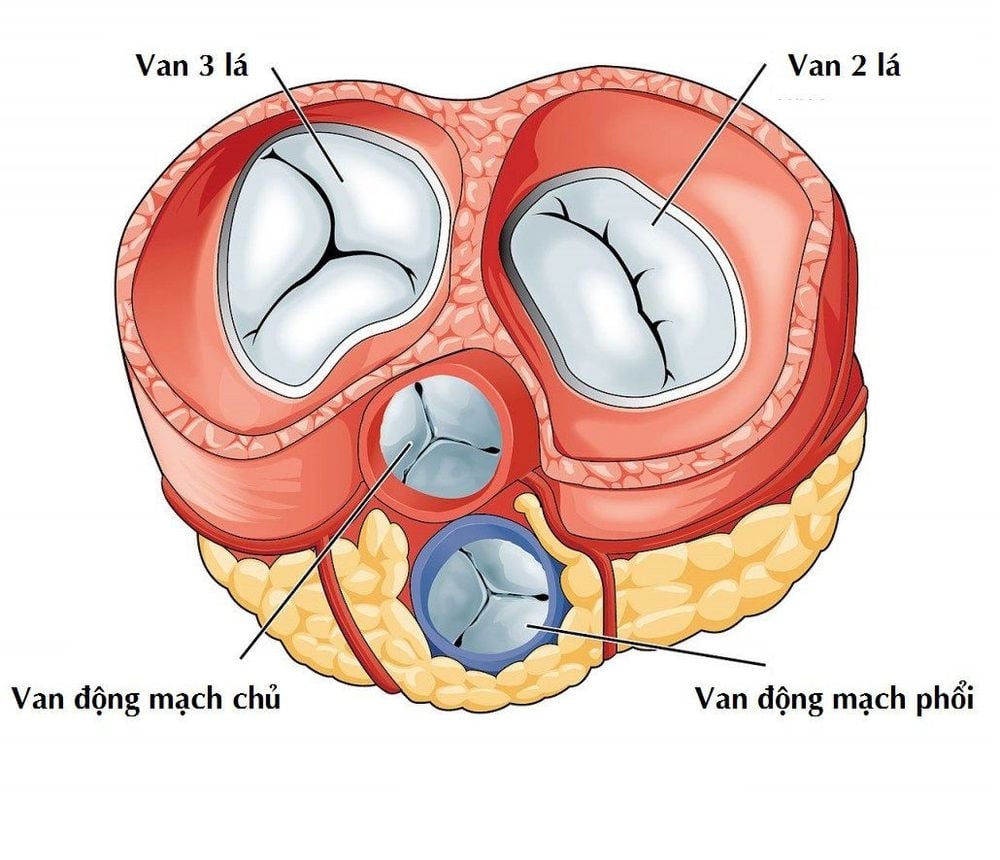
Vị trí van 2 lá
2. Methods of diagnosing mitral valve prolapse in patients
Echocardiography: This is a diagnostic method of mitral valve prolapse that is often applied without invasiveness to the heart. Echocardiography creates images and structures of the heart using high-frequency sound waves. The doctor can observe the mitral valve, the flow of blood, and measure the amount of regurgitation. X-ray: X-rays are produced from radiation that passes through the body and is reflected as an image on film. Diagnosis is made by looking at and analyzing images of the heart, lungs, and blood vessels. Electrocardiogram (ECG): In this noninvasive method, electrodes are placed on the chest to record the electrical impulses that make the heart beat. The recorded ECG electrical signal can help the doctor detect structural or irregular heartbeats, including mitral valve prolapse.
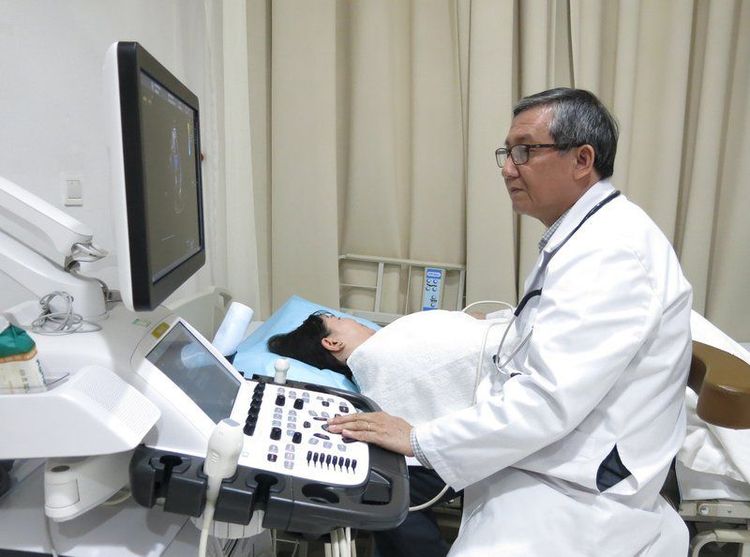
Siêu âm tim giúp chẩn đoán bệnh
Exercise testing: Often mitral regurgitation will limit exercise capacity in patients. The doctor will then order a stress test such as using a treadmill to diagnose mitral valve prolapse in a person. Cardiac Catheterization: In cases where the patient is suspected of having severe mitral valve prolapse that may require surgery, a cardiac catheterization will be performed first so that a detailed observation can be made to see if dynamic bypass surgery is needed. coronary artery or valve surgery or not. Cardiac catheters will be inserted into the body, and dye is injected into the blood vessels of the heart. The X-ray machine can see the dye and produce X-ray images that serve as the basis of diagnosis for the doctor. The technique also allows doctors to measure pressure in the heart in cases where there is concern about pulmonary hypertension. If the patient has mitral valve prolapse but has no specific symptoms or signs, he or she may be indicated for follow-up visits every 3 to 5 years, depending on the patient's condition.
3. Treatment of mitral valve prolapse
Most patients with mitral valve prolapse without symptoms will not need treatment for mitral valve prolapse. In contrast, for those with symptoms, depending on the severity of the disease, the doctor will have advice on using drugs or performing surgery.
3.1 Taking mitral valve prolapse with symptoms related to irregular heart rhythm, chest pain or other complications may prescribe certain medications, including:
Beta Blockers: Helps slow the heart rate heart rate and reduce force, reduce blood pressure to prevent common arrhythmias. This medication also works to improve blood flow by making blood vessels more relaxed. Aspirin: Often prescribed to patients with a family history of stroke. Aspirin can reduce the risk of blood clots. Anticoagulants (blood thinners): This form of medicine - warfarin (Coumadin) is usually prescribed to stop blood clotting. Patients with a history of stroke, heart failure or atrial fibrillation may also be prescribed this drug by their doctor. However, patients need to strictly follow the doctor's prescription to avoid potentially dangerous side effects.
3.2 Surgery Most people with mitral valve prolapse do not need surgery. However, some cases of mitral valve prolapse without symptoms or have progressed to a severe stage still require surgery.
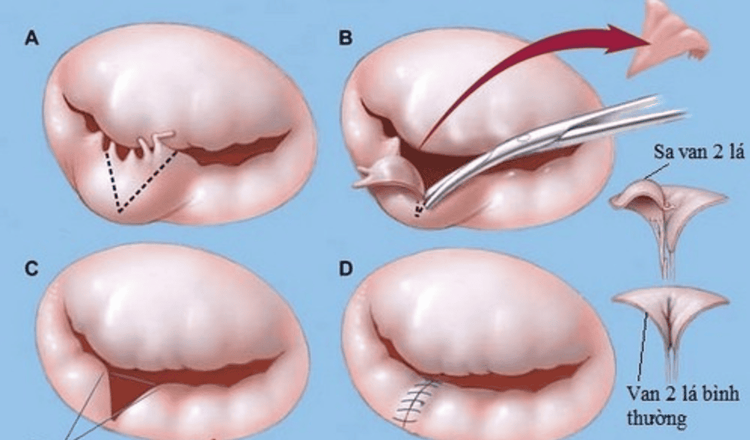
Phẫu thuật điều trị sa van 2 lá
Usually, mitral valve prolapse surgery will have 2 main options: valve repair or mitral valve replacement. Either option requires open heart surgery and significant recovery time.
Valve repair: Is a surgery to preserve the valve suitable for most patients with mitral valve prolapse. Valve replacement: indicated if valve repair is not possible. The damaged mitral valve part will be replaced with an artificial valve (including mechanical and biological valves). If using a mechanical valve, the patient needs to be combined with taking anticoagulants to prevent the formation of blood clots on the valve. It can be seen that although mitral valve prolapse is not a very dangerous disease, it still needs to be diagnosed and treated with appropriate mitral valve prolapse so as not to affect the patient's daily life.
To protect cardiovascular health in general and detect early signs of myocardial infarction and stroke, customers can sign up for Cardiovascular Screening Package - Basic Cardiovascular Examination of Vinmec International General Hospital . The examination package helps to detect cardiovascular problems at the earliest through tests and modern imaging methods. The package is for all ages, genders and is especially essential for people with risk factors for cardiovascular disease.
Master. Hoang Thi Hoa has more than 10 years of experience in the field of Cardiology, especially in the field of cardiovascular emergency and echocardiography. Doctor Hoa used to be the Deputy Head of Cardiology Department of Quang Ninh General Hospital before working at Vinmec Ha Long International Hospital.
If you notice unusual health problems, you should visit and consult with a specialist.
MORE
Mitral valve disease Treatment of tricuspid valve disease through minimally invasive open heart surgery with laparoscopic support Repair and replace mitral valve through minimally invasive open heart surgery
Please dial HOTLINE for more information or register for an appointment HERE. Download MyVinmec app to make appointments faster and to manage your bookings easily.




